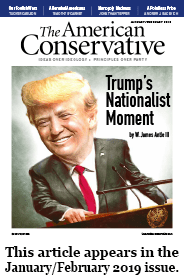Right From the Beginning

This is the editorial from the January/February 2019 print issue of The American Conservative.
The death of former President George H.W. Bush brought back memories of the last great American foreign policy triumph: a peaceful conclusion to the Cold War with the end of Soviet communism. Less remarked upon was the missed opportunity that followed our victory: presidents from Bush onward had the chance to bring America home, to be, in the title of an important Jeane Kirkpatrick essay, “A Normal Country In A Normal Time,” and did not take it.

Kirkpatrick wasn’t the only Cold War stalwart who saw the defeat of the Soviet empire as an opening to restore and reinvigorate the American Republic. TAC founding editor Patrick J. Buchanan, who celebrated his 80th birthday in November, challenged Bush’s vision of a “New World Order” with a conservatism predicated on realism and restraint.
Since we abandoned this genuinely conservative approach to foreign policy, our victories have been much fewer. The warning went up when Bush 41 launched Operation Desert Storm, but he at least had the wisdom to stop short of Baghdad. His son, under the sway of neoconservative ideologues who had been safely contained in previous Republican administrations, did not, and we are still reaping the disastrous results.
Don’t take our word for it. Many who painted this magazine’s opposition to the Iraq war as somehow antithetical to conservatism will tell you so. “I regret advocating the invasion and feel guilty about all the lives lost,” writes Max Boot from his Republicanism repentance tour. “It was a chastening lesson in the limits of American power.” In his final book, the late Senator John McCain conceded the Iraq war “can’t be judged as anything other than a mistake, a very serious one, and I have to accept my share of the blame for it.”
“Knowing what we know now, I would have not engaged, I would have not gone into Iraq,” said Jeb Bush on his fourth try while still a candidate for president. “The United States overestimated the threat from Saddam Hussein in 2003,” David Frum, who once branded editors and writers for this magazine “Unpatriotic Conservatives,” acknowledged in 2014. “Without an active nuclear-weapons program, he was not a danger beyond his immediate vicinity. That war cost this country dearly.”
William F. Buckley Jr., founder of National Review, which published Frum’s jeremiad against antiwar conservatives, arrived at this conclusion 10 years earlier: “With the benefit of minute hindsight, Saddam Hussein wasn’t the kind of extraterritorial menace that was assumed by the administration one year ago. If I knew then what I know now about what kind of situation we would be in, I would have opposed the war.”
TAC was, as Buchanan might say, right from the beginning. And still standing. Yet even as much of official Washington admits the obvious, they are unwilling to apply the lessons of Iraq to current conflicts. Similar arguments for regime change in Iran, Syria, and now Saudi Arabia ring out in op-ed pages across the land. Tensions mount with China and some clamor for a renewed Cold War, this time against a Russian government that despite its illiberal tendencies and fearsome nuclear arsenal is much weaker than the vanquished USSR.
We have had two consecutive presidents from each major political party who have to varying degrees recognized the failures of our post-Cold War foreign policy. Still, the presidential wars and the broad strokes of that policy continue. Our work is not yet done.
Comments